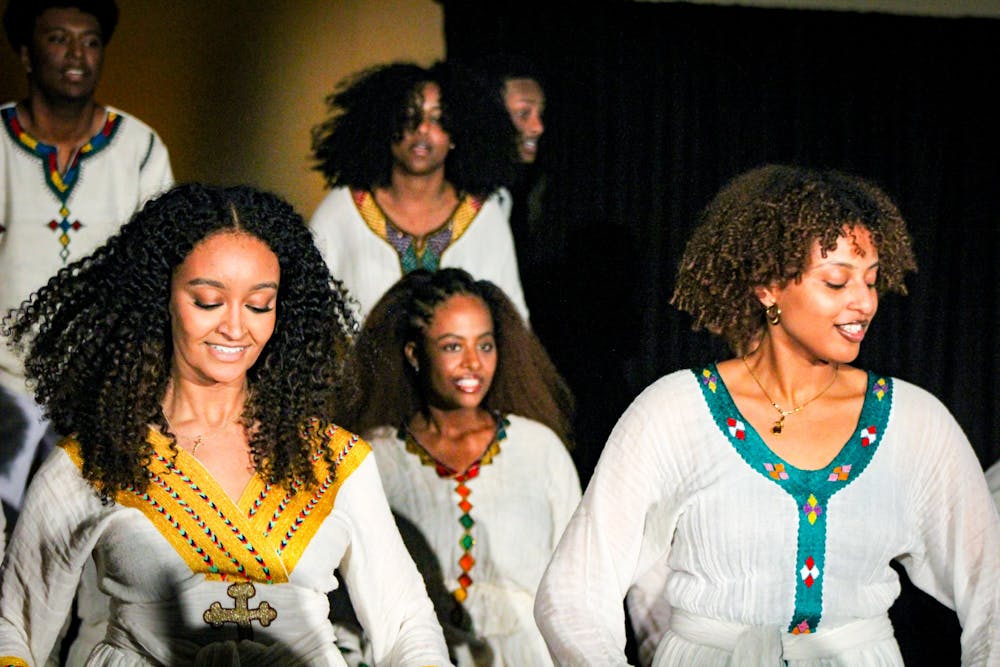The contagious joy and excitement were palpable in the intricately transformed Newcomb Ballroom, as around 200 students, parents and community members gathered to celebrate and take part in East African culture — embracing the rich heritage of Ethiopia, Eritrea, Somalia and Sudan.
The Ethiopian-Eritrean Student Association held its dinner and art showcase, “A Taste of the East”, this Saturday from 5 p.m. to 10 p.m. Attendees of the event enjoyed show-stopping performances from members of EESA’s dance group, spoken word performances, a fashion show and musical performances — co-hosted by two EESA members, second-year College student Lidya Niguse and third-year Engineering student Janco Megerssa.
The event served not only as a place for students to celebrate their culture and heritage, but to also raise donations for charity. EESA donated all their proceeds from the event’s entry fees and other donations to two charities — Shamida Ethiopia, which works to empower Ethiopian women and children, and Eritrean Community Connections, which supports Eritrean immigrants and refugees settling in the United States.
This year’s theme centered around the idea of roots — connecting to and celebrating one’s past and recognizing how it continues to impact the present day. Fourth-year Batten student Gabriel Sirak, EESA’s vice-president and the show’s creative director, worked tirelessly with other club members since the fall semester to bring their vision of an immersive show to life with an underlying theme of connecting with one’s heritage.
“What I think informed lots of the show's direction this year, was the assertion that our tradition is modern tradition,” Sirak said. “It has been about trying to reclaim that idea that there is no test for what's modern, what's appropriate — it's truly homegrown.”
Sirak emphasized the importance of highlighting the unique traditions that stem from Ethiopia, Eritrea, and the rest of eastern Africa. Alongside other acts in the program, EESA put on three fashion shows and two dance performances.
The three segments of the fashion show were titled, “Roots”, “Contemporary” and “Looking Beyond”, illustrating the evolution of East African cultures over time — from traditional clothing passed down for generations, to the cultural revolution in the 20th century and to present day fashions. 30 models sported an array of clothes, from vibrantly colored traditional dresses to curated modern looks, with the rhythmic beats of traditional Ethiopian music echoing from the speakers.
20 dancers, split up into smaller groups for each performance, demonstrated traditional dances, also set to music, from some of the several different ethnic groups in Ethiopia and Eritrea. Each dance was introduced by the show’s co-hosts, who presented an overview of the region and key aspects of the routine.
“What's really refreshing about this year is that it's very informed in terms of different regions, different tribes, as Ethiopia and East Africa are very ethnically diverse,” Sirak said.
Each of the modeling and dance performances elicited joyful cries of support from the crowd, with applause booming all around the ballroom. The finale of the dance performances was when all 20 dancers took the stage at once. The dance, Eskista, is characterized by the intense and rhythmic moving of the shoulders. It electrified the audience — who rejoiced in loud cheers several minutes after the performance was over.
Sirak has been involved with A Taste of the East since his second semester at the University, and started out as a model for the show. He cherishes the opportunities EESA has given him over the years to connect him with his community and strengthen his sense of identity.
“I think it's all been about giving back to something that's a bit bigger than me,” Sirak said. “Both in the context of my time here at the University, but also in my role as a child of Ethiopian immigrants… doing what I can here to share everything that my parents showed me is what I can do to pay back for all of the lessons they taught me.”
Traditional food was catered by Dama and Afghan Kabob. and there was a photobooth lined with balloons. Attendees milled around the space browsing a wide selection of products put up for purchase, including paintings, jewelry and clothes — some crafted by University students themselves.
Fourth-Year College student Sadia Hossain was eager to attend the event to support her friends who were modeling in the show. She also brought her younger sister, a prospective student, to the event.
“I really wanted her to get exposed to U.Va culture [and how] very enriching it could be… It’s just great to see how much the University has evolved from my first year to my fourth year and how much investment there’s been into diversity and inclusion,” Hossain said.
While A Taste of the East was an impressive spectacle available for the entire University community, EESA members themselves found the event to be especially meaningful. The event and club served as a place for members to strengthen their sense of solidarity and feel deeply connected to their heritage while at the University.







